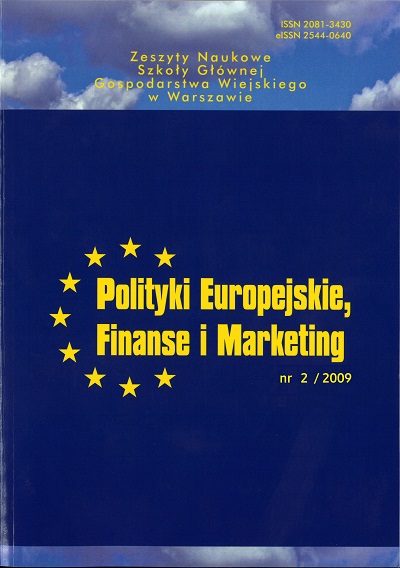Main Article Content
Article Details
Backhaus J.G.: Henry George's Ingenious Tax: a Contemporary Restatement - Special Issue: Commemorating the 100th Anniversary of the Death of Henry George, "American Journal of Economics and Sociology", October 1997. (Crossref)
Begg D., Fischer S., Dornbusch R.: Ekonomia .T1, PWE, Warszawa 1993.
Blaug M.: Teoria ekonomii. Ujęcie retrospektywne, Wydawnictwo Naukowe PWN, Warszawa 2000.
Bringham E.F., Gapenski L.C.: Intermediate Financial Management, Dryden Press, Hinsdale, 1990.
Czyżewski B.: Instytucjonalne uwarunkowania rozwoju rolnictwa w Polsce w świetle teorii nowego instytucjonalizmu, Materiały VIII Kongresu Ekonomistów Polskich, 2930 listopada 2007.
Czyżewski B.: Renta instytucjonalna jako wyznacznik przewag komparatywnych gospodarstw rolnych, "Roczniki Naukowe Seria", tom X, zesz.3, Warszawa-Poznan- Lublin 2008.
Czyżewski B.: Współzależności integracji kontraktowej i cen rolnych w gospodarstwach indywidualnych w Polsce, "Roczniki Naukowe SERiA", Tom VIII, Zeszyt 5, Poznań 2006.
Fiszel H.: Renta gruntowa - kandydat do rehabilitacji, "Życie gospodarcze" 1957.
Foldvary F.E.: The Marginalists who Confronted Land, , "American Journal of Economics and Sociology", January 2008. (Crossref)
Gburczyk S.: Podział korzyści ze wzrostu efektywności, "Zagadnienia ekonomiki rolnej", 4/5, 1990.
George H.: Progress and Poverty, New York, Schalkenbach Foundation, 1981 [1879].
Marks K.: Kapitał, t. III, cz. II, Warszawa 1959.
Mieszczankowski M.: Teoria renty absolutnej, Warszawa 1964.
Ricardo D.: Zasady ekonomii politycznej i opodatkowania, PWN, Warszawa 1957.
Robinson J.: The Economics of Imperfect Competition, London 1948.
Rodbertus K.: Pisma ekonomiczne, Warszawa 1959.
Samuelson P.A.: Economics, New York 1958.
Smith A.: Bogactwo narodów, Warszawa 1954.
Szymański W., Czy globalizacja musi być irracjonalna?, Wyd. SGH, Warszawa., 2007.
Williamson O.E.: Ekonomiczne instytucje kapitalizmu, Wydawnictwo Naukowe PWN, Warszawa 1998.
Woś A.:, Waloryzacja zasobów i czynników wytwórczych rolnictwa. Nowe kryteria wyboru, IERiGŻ, Państwowy Instytut Badawczy, Warszawa 2006.
Downloads

This work is licensed under a Creative Commons Attribution-NonCommercial 4.0 International License.
All articles published in European Policies, Finance and Marketing are fully open access. In this way, the scientific research results contained in articles published in our journal are available to every reader free of charge - in accordance with the CC BY-NC license (https://creativecommons.org/licenses/by-nc/4.0/).
According to the CC BY-NC license you are free to:
- Share — copy and redistribute the material in any medium or format
- Adapt — remix, transform, and build upon the material
The licensor cannot revoke these freedoms as long as you follow the license terms.
Under the following terms:
- Attribution — You must give appropriate credit , provide a link to the license, and indicate if changes were made . You may do so in any reasonable manner, but not in any way that suggests the licensor endorses you or your use.
- NonCommercial — You may not use the material for commercial purposes .
- No additional restrictions — You may not apply legal terms or technological measures that legally restrict others from doing anything the license permits.
Source: https://creativecommons.org/licenses/by-nc/4.0/deed.en
According to that, the authors retain the copyright and full publishing rights.





